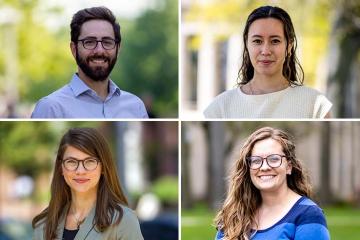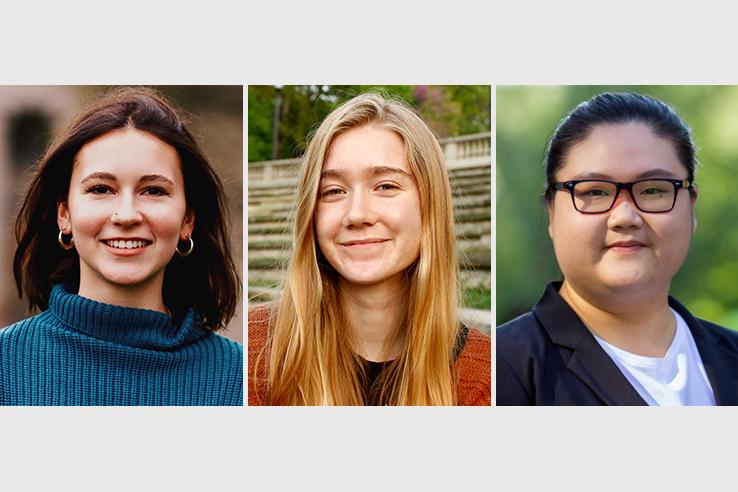
J-PAL North America Staff Spotlight: State & Local Innovation Team

In the third part of an ongoing Staff Spotlight series, we showcase three J-PAL North America team members who have staffed our State and Local Innovation Initiative, which builds capacity for state and local governments to generate evidence about programs and policies that alleviate poverty through randomized evaluations. These staff and alumni speak about experiences that led them to J-PAL, discuss their academic backgrounds, and share favorite aspects of their roles.
Maria Arzumanov
Maria (Masha) Arzumanov is a policy associate at J-PAL North America. She helps equip US state and local leaders with rigorous evidence to address social problems in their communities, as well as supporting our work in crime and violence prevention and the Environment, Energy, and Climate Change team.
How did you first learn about J-PAL North America?
I heard about J-PAL while earning an MSc at the London School of Economics in the Department of Government. We’d covered J-PAL studies in my classes, and my thesis advisor recommended J-PAL when I was looking for positions after grad school. The application and interview process felt competitive but extremely unbiased, which I appreciated.
What aspect of your role do you enjoy the most?
I enjoy working closely with J-PAL affiliated researchers, like our co-chair for the State and Local Innovation Initiative, Bruce Sacerdote. I actually cited his work in my master’s dissertation (thanks, Bruce!). With my dissertation, I primarily worked independently; I had a thesis advisor, but I alone was responsible for thinking through my research design. Now I support the Request for Proposals process, and I’m able to see how our co-chairs consider research design and identify feasible projects in order to award funding.
Can you share more about your dissertation?
My master’s dissertation focused on how Congressional stockholding impacts the way votes are cast in the House of Representatives. In the study, I employed a Differences in Differences design and exploited the timing of the stock market crash in 2008 to compare voting habits of stockholding and non-stockholding representatives before and after the crash. J-PAL has funded randomized evaluations on political economy and voting, and I’m really interested in potential misalignment between government policies and public demand. In my eyes, J-PAL seeks to reconcile this misalignment by trying to inform policy with what communities need.
How has J-PAL North America helped you in your career goals?
Working at J-PAL has made me more cognizant of how to use evidence in policy, and how so many contemporary policies could be improved by leaning on economics research. I also think there are increasingly more opportunities for federal, state, and local governments to use evidence in their decision-making—the funding provided by the American Rescue Plan is a recent example. In the future, I’m keen to pursue research that fills gaps in our understanding of what policies work.
What’s something you’ve always wanted to do, but haven’t yet?
I like hiking quite a bit, and I’ve wanted to climb Mount Kilimanjaro for a long time. I think my goal would be to climb it and bring a little speaker so I can listen to “Africa” by Toto as the sun rises at the top—I think that would be ideal.
Mera Cronbaugh
Policy Associate Mera Cronbaugh works with US state and local governments to develop rigorous evidence to inform policy and program decisions. Read how her interest in economics and financial services led her to J-PAL North America, and discover her advice for prospective candidates.
What drew you to J-PAL North America?
I grew up in Russia, a country with a very different economic history from the United States, and was drawn to study economics in college. I appreciated that it could be used to understand high-level systems with real impact on communities. Economics was very abstract, however, and so along with economics and Russian, I began studying consumer and family financial services.
During an internship at a financial planning start-up and my time as a peer financial coach at The Ohio State University, it became clear that it wasn’t just lack of awareness or individual-level access that served as barriers to financial inclusion. I witnessed how these services were inaccessible to much of the population in ways that were difficult for individual organizations to address. I was drawn back to economics as a discipline that had the tools to both understand and address these systemic barriers. During my senior year, I learned about the exciting work J-PAL does to translate evidence and data into action to promote community wellbeing and reduce poverty. I started out as an intern after graduation and transitioned into a Policy Associate role in January.
What aspect of your role do you enjoy the most?
I love working on our State and Local Innovation Initiative. I especially appreciate learning about what state and local government agencies across the country are doing to support their communities. I’ve enjoyed actively collaborating with governments to review existing evidence on social programs. Recently, I’ve also supported the design of new evaluations to assess promising solutions to pressing policy challenges.
Do you have advice for prospective J-PAL North America candidates?
J-PAL staff care deeply about the work we do. At J-PAL, your experiences, interests, and passions are valued. I encourage a prospective candidate to share their interests and experiences during the hiring process.
What’s something you’ve always wanted to do, but haven’t yet?
A life goal I have is to climb Mount Elbrus (or in Balkar, Mingi Tau [Минги тау]). It’s the tallest mountain in Europe, located in the Caucasus Mountains in southern Russia and is, in my humble opinion, one of the most beautiful places in the world.
Yiping Li
Former Senior Policy Associate Yiping Li led our work in crime and violence prevention and coordinated partnerships with state and local governments. Read how her life experiences, psychology background, and interest in the legal system led her to J-PAL.
What drew you to J-PAL North America?
I was drawn to J-PAL North America because of my interest in domestic poverty alleviation. I grew up in a low-income neighborhood in Chicago. I remember filling out SNAP applications for my immigrant neighbors as an 11-year-old because they didn’t know where to turn to for help. I remember being excited to work in my local library through One Summer Chicago, a summer youth employment program, after spending previous summers indoors because of lack of available opportunities. Because of my personal experience, I know the potential impact J-PAL’s work can have on people living in poverty, because they are my community. I don’t have to imagine who can benefit from our work; it’s my community that could benefit when we get things right. I’m very glad to be in a position to grapple with these issues and hopefully change things for the better.
Tell me about your educational background.
I was a developmental psychology major and was interested in the research process: how to use experiments to answer questions and use data to back up claims. That made it easier to transition from psychology to economics, even though I only took one economics class. Outside of academics, during all four years of college, I volunteered at a student-run organization that provided free legal information to those navigating through the Massachusetts small claims court system. There, I was shocked that the legal system would make it so difficult for the people it is meant to serve.
When I started leading the crime and violence prevention work at J-PAL, I spent a lot of time thinking about the roles of institutions and policies on an individual’s interaction with the legal system, rather than seeing it as an individual decision. Are there obstacles leading them to criminal activity? Or is there something about their environment that is increasing their risk of interacting with the criminal legal system? How can we work on addressing those factors instead of just focusing on the individual?
What aspect of your role did you enjoy the most?
There are many state and government leaders who have the interests of their constituents at heart and want to use evidence to guide their decisions, but they have capacity constraints. I enjoyed helping leaders to think through strategies and navigate obstacles with their policies and programs.
What is your hidden talent?
I started learning Chinese calligraphy at six years old. When I was nine, my work was included in a published selection of calligraphy. I have a Level 8 certification out of 9 levels. One day, I hope to receive the Level 9 certification, but we will see how it goes.
This post is the third in a series highlighting staff at J-PAL North America. The first post features our health team and the second post showcases our communications and fundraising team. To learn more about our staff and their accomplishments, follow J-PAL North America on LinkedIn.


